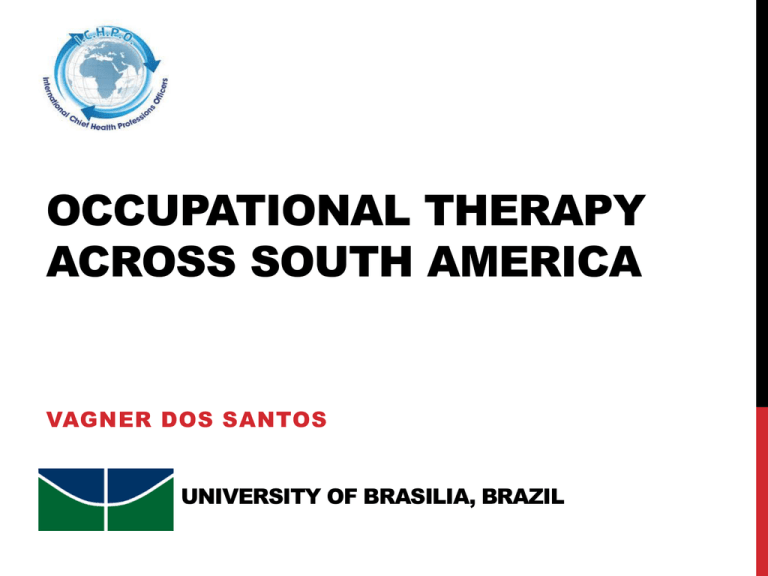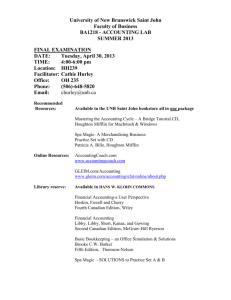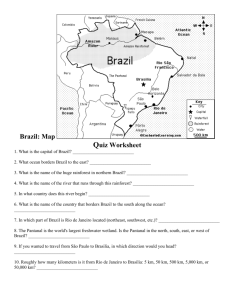occupational therapy acrros south america
advertisement

OCCUPATIONAL THERAPY ACROSS SOUTH AMERICA VAGNER DOS SANTOS UNIVERSITY OF BRASILIA, BRAZIL UNB, BRAZIL AIMS • Contextualize South America • Provide some figures of disability in the region • Share an overview of Occupational therapy within the region UNB, BRAZIL SOUTH AMERICA SOUTH AMERICA UNB, BRAZIL • Countries • 12 Countries • Demographics • Population of nearly 400 million inhabitants • • • Brazil has almost 200 million inhabitants Guyana has less than 1 million inhabitants From Rural villages to Megacities • Large scope of languages and cultures UNB, BRAZIL SOUTH AMERICA São Paulo, Brazil. Source: https://en.wikipedia.org/wiki/São_Paulo UNB, BRAZIL SOUTH AMERICA Bellavista – Pachas, Peru. Source: http://www.pueblosdelperu.org/foto/1278062 SOUTH AMERICA UNB, BRAZIL • Social - Economic – Political • Commons elements • • • Large Inequalities History of racism Violence (from structural to everyday violence) • Political Shifts (Social Change) • Rise and fall of military dictatorships • ‘Turn to the left’ • Implementation of redistributive policies DISABILITY IN SOUTH AMERICA UNB, BRAZIL • Statistics – Methodological Issues • Estimates indicate that at least 10% of the region’s population has some disability (The World Bank, 2004). • In Brazil, there are higher estimates: 24% of the population (approximately 45.6 million) has some form of disability (IBGE, 2010). • Social Exclusion • Cycle of Poverty and Disability (The World Bank, 2004; 2011) • • Disability as cause and consequence of poverty. About 82% of disabled people live under poverty. • Caregivers and family members are also affected. DISABILITY IN SOUTH AMERICA UNB, BRAZIL • Education • Poor attendance due to lack of: • • adequate transportation and access to school infrastructure teacher training and learning materials • Employment • Most disabled are outside the work force UNB, BRAZIL Source: The World Bank, 2011 DISABILITY IN SOUTH AMERICA REHABILITATION: UNB, BRAZIL WHAT FOR? FOR WHOM? HOW TO DO? • Poverty and disability • What are the aims and the limits of rehabilitation in the context of poverty? • Intersectioralities • How to overcome the biomedical model of rehabilitation? • Cultural constructions of disability & Colonialism • Which forms of engagement are needed to decolonize (theory and practice) OCCUPATIONAL THERAPY UNB, BRAZIL • Occupational therapy’s history in South America • 50’s, 60’s and 70’s: process of implementation • • International and national collaboration Influence of Northern Frameworks • (which to some extent last until nowadays) • 80’s and 90’s: transitions towards more local and regional identities of occupational therapy • • • Ruptures from mainstream OT Integrate humans rights into OT practice Engagement with political action OCCUPATIONAL THERAPY UNB, BRAZIL • During XXI Century Occupational Therapy has expanded and grown • According to WFOT (2014) the region has had a substantive percentage increase in the number of occupational therapists from 2006 to 2014 • • Argentina: 182% Brazil: 119% OCCUPATIONAL THERAPY UNB, BRAZIL • Contemporary issues of occupational therapy across the region • Develop and implement new training programs that: • • • Overcome the medical model Engage with local / regional realities Explore the meanings of disability and individual experience and integrate with educational programs • Mass concentration of OT’s in Metropolitan areas: • • Decentralization of human resources Learn about diversity of human presence and everyday life across the region UNB, BRAZIL TO SUM • South America is a region of diversity, but there are common elements. • To overcome poverty, inequality, racism, structural and everyday violence are among the most pressing challenges (prevent disabilities). • Assure social inclusion. The exclusion of people with disability has been a major impact into our societies. • Occupational therapy has the challenge to understand the realities of those living with disability. This includes also social, political, economic aspects of everyday life, which have been historically neglected in rehab. • OT has to develop a coherent and relevant practice. UNB, BRAZIL Thank you! Further questions/comments and list of references: vagner@unb.br





